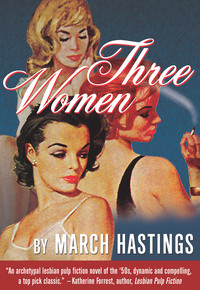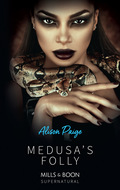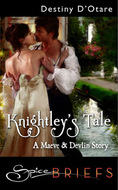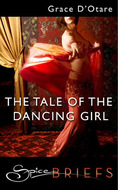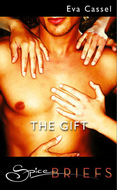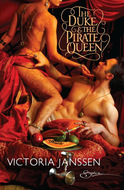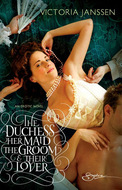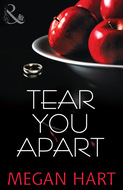Raamatut ei saa failina alla laadida, kuid seda saab lugeda meie rakenduses või veebis.
Loe raamatut: «Three Women»

In 1950, Fawcett founded the Gold Medal imprint, inaugurating the era of lesbian pulp fiction. These were the books that small town lesbians and prurient men bought by the millions—cheap, easy to find in drugstores, and immediately recognizable by their lurid covers. For lesbians, here was the confirmation that they were not alone and that darkly glamorous, “gay” places like Greenwich Village existed. In the over-heated prose typical of the genre, these books document the emergence of a lesbian subculture in postwar America.
Three Women
March Hastings

MILLS & BOON
Before you start reading, why not sign up?
Thank you for downloading this Mills & Boon book. If you want to hear about exclusive discounts, special offers and competitions, sign up to our email newsletter today!
Or simply visit
Mills & Boon emails are completely free to receive and you can unsubscribe at any time via the link in any email we send you.
Table of Contents
Cover
Excerpt
Title Page
Part One
Chapter 1
Chapter 2
Chapter 3
Chapter 4
Chapter 5
Chapter 6
Chapter 7
Part Two
Chapter 8
Part Three
Chapter 9
Chapter 10
Chapter 11
Chapter 12
Chapter 13
Chapter 14
Endpages
Copyright
Part One
1
He lurched at her from the doorway. Flakes of snow glistened on his straggled eyebrows. She smelled the stench of whiskey in his clothes.
“Go on, mister. Keep moving.” Paula jostled him away with her free hand and hurried along First Avenue. The freezing streets were slippery beneath her boots but she plunged forward, splashing into lakes of snow and ice gathered at the curb. She hated these winter nights worse than the steaming nights of summer. The wind tore savagely at her face. It seeped in past the woolen scarf and settled bitterly around her neck beneath the chestnut hair. As far as she could see the Avenue was black and lonely. But she knew that men huddled in corners, some asleep and not feeling the cold, others alerted by wild visions more fantastic than the freezing, howling night around her.
With the container of milk hugged close, she hurried into the entrance of the tenement and through the narrow hall strewn with garbage the kids had pulled out of cans. She clomped up the three flights lighted by weak bulbs and let herself into the apartment. This wasn’t home to her. It was the place where Ma and Pa and Mike and she happened to live because it was cheaper for everyone to live together there.
She set the package on the small table in the foyer and hung up her coat and scarf on the hook beside Mike’s leather jacket.
“That you, Paula?” Her mother called from where she stood at the stove, moving a big wooden spoon in a pot of rice.
You could see the kitchen from the foyer. You could see the bedroom beyond the kitchen where Mike sat cross-legged, reading an airplane magazine like he was in his own private library on Fifth Avenue.
“I just made it,” Paula said, breathing on the tips of her fingers to get out the sting. “He was just about closing when I got there.” She brought in the paper bag and pulled out the container of milk.
Why did her Pa always have to get his attacks late at night? Why didn’t he stop drinking so he could eat meals like a normal person? She wanted to respect him but it was hard not to get angry at a man who insisted on killing himself, eating away his stomach with poison that didn’t even give him pleasure anymore. She poured milk into a saucepan and set it on the stove beside the rice.
“I wish we could keep some extra around for times like this,” Paula said. She didn’t want to tell her mother about the nastiness with that man outside. When a girl gets to be eighteen, there’s no excuse for being afraid. You comb your hair down long around your shoulders and wear the kind of clothes that show off your body so that men will look at you. And you just hope they’re the right kind of men. If it happens to be the other kind, you fight your way through and hope for better next time. Because, she guessed, that’s life.
Paula took a bowl from the cabinet on the wall and held it while her mother spooned in a mushy helping of rice, straining the starchy water out against the side of the dented pot. Then she spilled the warm milk on top and set the bowl on the checked oilcloth that covered the kitchen table.
‘Your father’s in the bedroom. Why don’t you go see if he wants to eat?”
For the first time, Paula smiled. She knew her mother was thinking the same thing she was thinking. But Ma was the kind of woman who never told her husband what to do.
“Sure, Ma,” she murmured with sudden softness. Her mother had black hair that she wore braided and coiled on the back of her head. It was the one really neat thing in the whole place and Paula liked to look at it sometimes. It made her feel ladylike and uncluttered and gentle to look at her mother’s shining hair.
In the bedroom her father lay on his side, knees pulled up almost to his chin. He bit his lip and squinted at the wall, mute with pain. Heavy flowered curtains at the window made the room seem smaller and warmer. The silver crucifix above the bed glowed with half-reflections from other rooms. Paula sat down beside her father and put a hand lightly on his arm.
“Pa,” she said softly. “Pa, you want to come in and have something? You’ll feel better.” She didn’t know why she should feel sorry for him. For that matter, Paula didn’t know how she could hate and love him at the same time, but she did.
Pa didn’t say anything. He looked at her and squeezed her hand. The sleeve of his long underwear had a ladder-like run in it. Pale skin showed through, strangely smooth like a baby’s. Her own skin had that same delicate quality so she could never get really tan in the summer.
Maybe she loved him because she remembered how they used to play at Coney Island and those white arms would hold her safely above the huge and thundering waves that rolled in.
“Maybe, if I brought it in here,” she continued, “you could take a few spoonfuls?”
“No.” The voice was a grunt. “I’ll come inside. In a minute.” His body twisted suddenly in pain.
She waited for the spasm to pass then helped him sit up. Iron grey bristles on his chin made him look older than forty-five and he breathed heavily like a very old man, clinging to the edge of the bed with trembling hands.
Her arm around his waist, his weight full against her, Paula helped her father out of the room. They passed the dresser near the door, and she noticed for the thousandth time her parents’ wedding picture. It looked almost like new, the faces smiling and proud. For the thousandth time she thought: This will happen to me too. It happens to everybody.
In the other room Mike lit his new corn cob and sweet-smelling clouds followed Paula and her father into the kitchen.
She wanted to go to sleep because tomorrow was a big day. But she waited to clean up like she always waited. Phil would tell her she looked great anyway; she knew that. Besides, no matter how she felt, she never looked tired in the green dress.
It was past one o’clock when she finally wound the big alarm clock and crawled into bed. The knowledge that it wouldn’t have to ring tomorrow gave her a sense of freedom and comfort. She snuggled under the rough wool blankets, adjusted herself around the lumps in the mattress, and thought of Phil, smiling, till she drifted into sleep.
Fiercely bright, the sun stabbed at Paula’s eyes. She turned to escape back into darkness but it was too late. The heavy odor of coffee came to her nostrils and she heard her father snap on the radio to the nine a.m. news. Cups and dishes rattled in the kitchen where Mike was cramming breakfast because the gang was waiting for him in the clubhouse.
Struggling up from under the covers, she stared out to the cloudless sky alive with golden light. The windows faced the courtyard. As she grew slowly more awake, her ears caught the sound of kids yelling as they threw snowballs at each other. With a sigh she lifted herself on both elbows and tossed the tangled curls back from her shoulders.
Saturday. Good to be alive on Saturday. No rush hour, no switchboard. Lazy, wonderful Saturday spreading around you, letting you believe it was forever.
She slid out of bed, glad that she had forgotten to pull the shades down, and stood in the play of sunshine. She stretched in its warmth and smiled dreamily. The linoleum felt smooth and cool to her bare feet. She picked up her skirt and sweater and padded into the bathroom. The big water box gurgling above the toilet all the time didn’t irritate her this morning. She splashed water on her face and neck to wash rather than waste gas to heat up enough water for a bath. Later she would take a long hot bath till her body glowed.
By the time she came in for breakfast, the meal was ready and Mom had the shopping list all made out. Paula ate a scrambled egg with two pieces of toast that had charcoal marks across them from the toaster coils. But even the burnt part tasted good to her this morning. Anything would.
Imagine: Phil wanted to show her off to the relatives! And to Aunt Bernadette, of all people. The aunt who paid for trade schooling and down payments on cars and — and marriages.
The thought of Aunt Bernadette propelled Paula happily through the supermarket crowds of people and baskets. She wheeled her own cart skillfully, tossing lunchmeat on top of jello on top of soapflakes. The fact that Mike was certainly old enough to help didn’t occur to her as she hefted a heavy bag in either arm and pushed her way out.
Mom, in the same apron that she had been wearing all week, checked the list of prices against the items and dropped the pennies into an old preserve jar behind the salt shaker.
“I don’t know,” she said. “Maybe Mike should get a part time job.”
“Fat chance,” her father snorted and opened the paper that Paula had brought.
“When is that boy going to stop living in his own world?” her mother mumbled.
“When he gets a girl,” Paula said. “A girl is what makes a man a man,” she said wisely.
Her father laughed with affection. “Don’t you know it,” he said.
“Yes,” Paula answered, trailing off to take the bath she had promised herself. As she closed the door to the bathroom, she heard her mother’s voice. “You shouldn’t joke that way with her. That child doesn’t know as much as you think.”
Oh, don’t I know!
Paula grinned and released a spluttering stream of hot water into the tub. She knew sitting upstairs in the movies with Phil’s leg pressed against hers. She knew her own softness pulled up tightly to the muscles of his body hard under the material of his shirt. She knew the thrilling strength of his lips seeking eagerly into the curve of her throat.
She knew a lot, thought Paula. Almost everything.
Gingerly she put a toe into the steaming water, then lowered herself slowly, wincing until her skin became accustomed to the heat. She stretched out and lay for a while, feeling her body trying to rise in the full tub of water, watching the small waves lap across her young bosom.
She wished she were big up top like some of the movie stars so that full flesh would swell over the neckline of her dress. If she had that kind of body, she would wear a small golden heart on a chain just long enough to point there and attract attention to what she had.
Suddenly a little embarrassed at herself, she grabbed the cake of soap and began lathering her body furiously.
Small curls clung damply to her forehead as she rubbed her arms and back vigorously with the towel a few minutes later. She sprinkled herself generously with lilac talc and discovered there wasn’t enough left for between her toes. She hated to cover the gentle fragrance with bra and girdle but it gave her pleasure to slide the sheer stockings over her legs; the seams brought out the length and curve of what Phil called her “cheesecake gams.” Oh, he was a dear sweet wonderful guy. And she couldn’t imagine that even after twenty years he would take her for granted. Having Phil made her feel lucky, almost charmed.
She took the green dress out of the closet and brushed it carefully. Though it hung two inches away from all the other clothes jammed into the tiny space, a small wrinkle showed across the lap. Paula frowned at it and stretched the material taut, holding it like that for a minute, but the wrinkle was still there after she zipped herself into it, so she smoothed and smoothed hopefully. From a cardboard box she took out a strand of pearls and matching earrings. For Aunt Bernadette she thought she’d better be conservative. Besides, she looked her best when she dressed simply, more mature and well brought up somehow. She blotted the lipstick and smiled at herself to see if any of it had gotten on her teeth.
Giving her hair a last flick with the comb, she took a breath and waited for Phil’s double knock at the door. She didn’t expect him to be on time. He had always been five minutes late ever since they started dating nine months ago because he usually forgot his keys and had to go back up for them. They made a joke out of this key business. Ever since his folks separated, his ma had started locking the door when Phil went out. He just never got used to it.
Anyway, Paula was ready ten minutes early. She looked around the bedroom for something to do. She didn’t want to go into the kitchen and risk getting messed up, so she picked up a pencil and started nervously to sketch a face on the back of an old envelope. All the envelopes and margins of newspapers and backs of bills had Paula’s doodlings on them. Sometimes she copied a landscape from a calender, or a face. Back in high school, she had gotten the best marks in art class. Her pictures hung around the room during Open School week.
The double rap sounded lightly on the door and startled her. She dropped the pencil, grabbed her best coat and ran out to greet Phil.
“Well, hi.” A grin danced over the rugged face and brought out a dimple near the side of his mouth.
“Hi, yourself,” she answered, standing with the coat on her arm so he could admire how the dress fit and outlined her body.
He took the coat and held it for her. The top of her head just about reached his shoulders, the kind of broad shoulders that made all his jackets look padded. She liked his bigness and the darkness of his skin. Phil was like a wall she felt she could stand behind whenever she was cold or afraid.
“Did you notice?” he said. “I’m on time.” He tapped his trousers pocket. “Ma’s got a new system. She puts the keys in my pants before I get dressed.”
Paula noticed that he was wearing a new dark blue suit. The color made him look even darker, almost Arabian. If you didn’t know Phil, she thought, he could look like the most mysterious person in the world.
He came inside and said hello to Paula’s folks then said he couldn’t sit down for a minute. They had to run.
Paula followed him out and clattered down the stairs after him. It was fun trying to keep up with him in her heels. The big steps he took equalled three of her own.
Out in the street he put an arm around her and led her to the old Ford that had been his father’s. His coat lay across the front seat and he tossed it carelessly into the back.
He started the motor. Then he turned suddenly and grabbed her to him.
“No,” she protested in a thin voice. “I want to stay neat.”
“Oh, hell. What for?” His black eyes flashed smiling at her and the dimple danced. She smelled the briskness of his after-shave lotion and lightly kissed a razor nick on his chin.
“For your aunt, silly. Don’t you want me to look perfect?”
“You always look perfect. She’s not going to care what you look like anyhow.”
“Women always notice what other women are wearing.”
“That’s what you think.” He flicked the earring on her lobe, and then eased the car out into traffic.
Paula arranged herself more comfortably and took a pack of cigarettes from the glove compartment. “That’s not what I think. It’s what I know. Honestly, you men are so conceited. Do you all think women only look at you?”
“They’re wasting their time if they don’t,” he chuckled. “Besides, Bryne’s a regular guy. You’ll see.”
She let him win the argument; it was easier. Besides, it was better that way. She just wanted to sit and watch his big hands on the wheel. For all their size and strength, the fingers were trimly masculine so that she felt clean and beautiful when they touched her.
The afternoon traffic captured them on Lexington Avenue and she thought she should let Phil concentrate on the driving rather than talk to him. She lit a cigarette and put it between his lips. He let it droop from his mouth, squinting one eye against the rising smoke.
“You know,” he said, “I really hope the old gal takes to my idea. Boy, would it be a big step in the right direction.”
Paula caught the sudden seriousness in his voice and she realized that Phil was really depending on this afternoon. It never occurred to her that he would ever depend on anything except his own efforts.
“Well, of course she’ll go for it.” She filled her own voice with certainty. “It’s a very sensible idea. I could see where she would hesitate if you wanted to start out in a new business of your own. But buying a partnership in that paint store — that’s a going thing, for sure. Nobody with any brains would turn down such an offer.”
“I guess you’re right.” He pulled up for a red light and flicked the cigarette out of the window. “I guess you’re pretty damned right all the time. Aren’t you, honey?” He leaned over and kissed the tip of her nose.
The comfort of his compliment settled around her like the warmth of a blanket. She knew that Aunt Bernadette would give him the money. And then — then the world would open wide for Paula, too.
A poodle with a pink bow on its head looked at them from the car alongside and he pointed it out to her.
“You want to raise dogs someday? Lots and lots of puppies?”
She felt her face go warm and she couldn’t think of some quick, smart response.
“Oh, my baby’s blushing!” He laughed. “We’ll take care of that later.”
The car jumped forward again and she was glad that he had to keep his eyes on the traffic.
Aunt Bernadette lived in a brownstone house on East Eleventh Street. They drove slowly by, looking for a place to park. Slim trees ringed with metal guards lined the sidewalks and Paula thought how green and lovely it must be here in the springtime. This was the kind of street you can stroll along on a Sunday afternoon, quiet and pleasant and neighborly. On a street like this, you didn’t yell after your friends; you walked to reach them and then only chatted in a normal tone of voice.
Phil found an empty space near the corner and they had to walk halfway back. In her mind Paula prepared herself for sitting properly in an old fashioned chair and sipping tea from a delicate china cup. She hoped Aunt Bernadette would think she was a lady and a suitable companion for her nephew. If the old lady approved of her, she might be more kindly disposed to Phil’s proposition. Yes, Paula could help Phil appear serious and capable.
They reached the flight of steps. For a second she took Phil’s hand and squeezed it.
“Stop worrying,” he said.
She smiled weakly and followed him up to the shining black door.
Aunt Bernadette’s apartment was on the main landing. Paula patted her hair a last time as Phil lifted the brass knocker and let it drop.
They waited a few seconds before Paula saw the door knob turn.
“Hello,” the woman said as she opened the door, and Paula wondered if Aunt Bernadette were sitting in the parlor somewhere.
Phil pushed her inside and at the same time kissed the woman a big smack on the cheek.
“Paula, this is my Aunt Byrne,” he said.
For an instant Paula could do nothing but stare at the woman. This was Aunt Bernadette? she thought. Paula had expected wrinkles, but not a crease marred the face of this tall, stately, somehow ageless woman. The sun gleamed on her red blonde hair that fell in a soft wave to just below her ears. No pins held it in place and the hair tumbled at random like a young boy’s. Her hazel eyes slanted upward, large, almond-shaped, with a sly smile darting behind them. The clear skin with a hint of freckles across the nose was the kind of skin you wanted to touch and caress with your hands.
Paula remembered herself with a start and said, “How do you do.” Her voice almost cracked.
“Please call me Byrne,” the woman replied in a casual tone.
Instinctively Paula knew this person understood her nervousness. Phil helped her off with her coat and threw it on the low modern chair that stood near the window.
The huge living room was sparsely but comfortably furnished with simple things that gave Paula the feeling of easy living, easily acquired.
As Byrne motioned her to a chair, she noted a heavy gold ring on the fourth finger of her right hand. It was an ornate ring, without stones, almost like a wedding band. The fingertips shone with colorless polish.
“Has it been two years, Phil?” she said. “Or more? I seem to have forgotten that my nephew is this much of a man.” She stood beneath a large oil painting, with one arm leaning on a shelf of books. The white silk shirt fell in graceful folds down the long curve of her torso. Charcoal slacks picked up the line of her hips and carried the design of her body down to thonged sandals.
“Quit kidding,” Phil laughed nervously. Paula could tell he was nervous because of the quick way he was breathing. He put his hands in his pockets and jangled the keys as he walked around the mosaic coffee table, sat down on the edge of a chair, got up again. “We saw each other at Frankie’s wedding last year. And I haven’t changed at all since then. Except maybe something has been added, at that.” He winked at Paula.
Paula nodded, wondering why Phil was acting like such a child before this sophisticated woman.
Byrne tilted her head and gazed steadily at Paula. “You added wisely,” she replied. “I congratulate you.”
Desperately Paula wanted a cigarette. Her palms were perspiring. She felt sweat coming off on the material of her purse, but if she moved her hands, a dark stain would be noticeable and Byrne would see how ill at ease she really was.
Paula wanted to say something complimentary in return. She couldn’t just sit there forever, like an idiot.
“You have a lovely home,” she managed. “I think that’s a beautiful painting.” She nodded toward the nude figure of a woman seated on a plush stool. The back of the woman faced out and the light illuminated the lines of her shoulders and the curve of her back till the eye came to rest on the fullness of her buttocks. Paula had never realized before that a woman could look good from the rear like that. This one was beautiful.
“Byrne painted that herself,” Phil said.
“No. As a matter of fact, I didn’t.” She moved her hand up through the back of her hair and Paula caught the glint of fuzz on her neck. It made her shiver oddly. “I haven’t lifted a brush for too long. That one is the gift of a student and friend.”
“I’m sorry,” Paula said before she could stop herself.
Byrne turned full around and examined her curiously. The reddish eyebrows were so even and regular and lay so flat that they looked darker. “Sorry? For heaven’s sake, why, child?”
The word “child” made Paula’s throat tighten but she went on, a little flustered. “Because people who do something that they enjoy can’t be too happy when they stop.” She clutched her purse and bravely held her glance directly on Byrne.
She saw the woman’s lips part just the smallest bit as though she were about to question further. But evidently she thought better of it and the mouth spread into an appreciative smile.
Phil said, “Don’t tangle with Paula. She was the champion drawer in senior class. She may even be a frustrated artist, for all I know.”
“Do you paint, Paula?”
“No.” She dropped her glance to the sandals, wishing she hadn’t brought up the topic.
Byrne persisted, “Why not?”
“Oh, she’s got better things to do,” Phil put in.
“Why don’t you paint?” Byrne seemed not to have heard him.
“Oh, I’m not that good.” She tried to pass it off. “Doodling is more my speed, I guess.”
“And I keep her pretty busy, you know. Paula is a serious type. She’s not going to be one of those Bohemian mothers in dungarees and neglected kids.”
Paula knew he was edging in to talk about the store and she hoped Byrne would let him get to the topic. She didn’t know how to handle herself with this woman — Byrne paid attention to her as though she, Paula, were the important individual instead of Phil. She felt flattered by the woman’s interest but couldn’t explain it to herself. Why should she care if I paint? Why does she look at me and not at my clothes? A weird feeling rose in her and brought with it vague longings always resting somewhere dark and unheard. If only she could run away before Byrne saw too deeply. But she knew it was too late and that really, she didn’t want to run at all. She wanted to stay and let Byrne go somehow deeper, deeper until she could tell Paula what herself really was.
Phil lit his third cigarette and was motioning through the air with great display of self-confidence. “Paula isn’t one of those hare-brained beauties you see every day. She’s the kind who helps a man make his way in the world.”
“I understand,” Byrne said, patting Phil’s shoulder to tell him without words that he could stop raving now. “What say we drink to making one’s way in the world?” She found three highball glasses in a cabinet built into the wall and put them on the table. “Scotch? Bourbon?” She looked at Paula. And Paula knew that Byrne knew she didn’t drink.
“Scotch’ll be fine,” Paula said.
Phil got ice and poured the drinks.
Paula sipped at hers and didn’t like the bitter taste. Phil took long swallows, trying to fill himself with the strength to bring up his reason for being here.
Byrne saved him the trouble. She settled herself into the couch and crossed her legs. “Now tell me, little nephew, what can I do for you? I don’t suppose you’re here to socialize with your ancient relative.”
Paula thought: Ancient? You’ll be young forever.
“Well, the truth is,” Phil eased his way slowly, “I could use a little help if you want to give it.”
“Of course.”
“There’s this paint store on the corner of Third Avenue in the Seventies. Mueller’s. Maybe you’ve heard of it. They advertise in the buses.”
“I don’t ride buses.”
“Anyway, it’s a real good thing, this store. Busy, large. And it’s established. I have a chance to buy a partnership because one of the men is selling out and his son happens to be a friend of mine. If I could get in there …”
“What do you know about the business?”
“What’s there to know?”
Paula hoped he would say something that sounded smart. She didn’t like the way he was appealing to Byrne. As though she were the man and he a child — that’s how he sounded.
“Assuming there isn’t anything to know, how much do you need?”
He took a long breath. “Ten grand.” Putting his tongue in his cheek and making it bulge, he watched to see how she would react.
“That’s a lot of money for you, my boy.”
“I’ll be able to pay it back. You’ll get a part of it every six months.”
“That’s not the point.” She set the half empty glass on her knee. “I simply hope that you’ve chosen wisely. That size investment will make a responsible citizen of you overnight. Are you sure you want to sell paint for a living?”
“I can’t be a crumby mechanic’s helper all my life,” he blurted. “This is the kind of opportunity that gives a man a chance to be something. Get himself away from those lousy tenements.”
“And give him a chance to raise a decent family,” Byrne added, glancing at Paula.
“Right!”
“Oh, I don’t know,” Byrne shrugged. “You might just as well do this as anything. It sounds reasonable enough to my unreasonable mind.” She finished her drink and set it on the long table. “Sold, Philip. There’s no reason why I should give you a hard time when all this money came to me so easily.” The hint of some unrelenting memory shadowed her words.
Phil hadn’t expected her to agree so quickly. He sat on the edge of his chair, his long-winded efforts to convince her further abruptly interrupted.
“But if I were you,” she added more brightly, “I’d stock some art supplies for Paula. She may be wanting to experiment one of these days.”
Phil found himself. He came out of the chair and filled Byrne’s glass again. “Oh, you’re a pal. You’re a real pal.” He couldn’t find an expression big or grand enough. “I love you!”
Not knowing what to do, he bent over and kissed Paula. She moved back from his touch, self-conscious in the presence of this woman.
She wants me to paint, she thought. Without knowing whether I can do anything or not, she’s interested in me.
Paula looked past Phil, intensely wanting Byrne to say something more.
Tasuta katkend on lõppenud.
